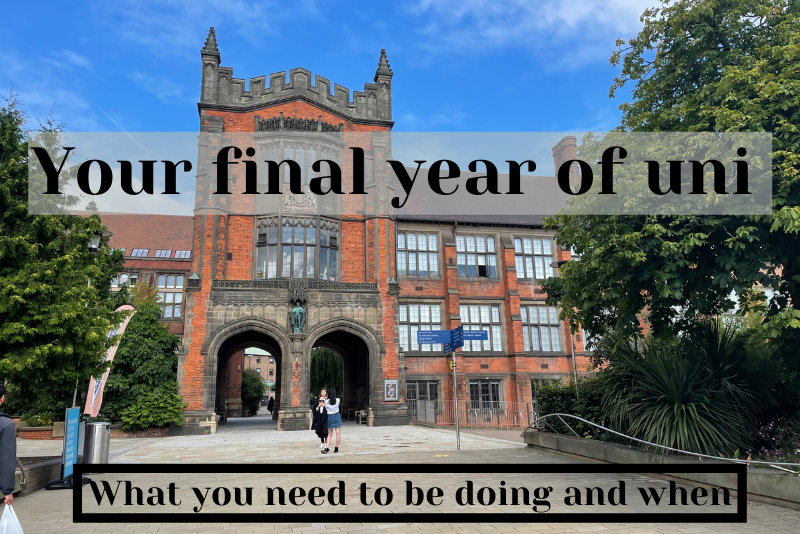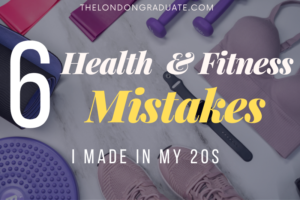There is a lot to think about when going into your final year of uni. You probably have assignments, exams and a dissertation to work on, perhaps on top of that you are involved in running a university society or have a part time job. It doesn’t leave a lot of time to consider what you want to do after university.
But trust me, the final year goes fast! While you don’t need to prepare in advance, if you are keen to go straight from uni into a graduate job or further study, you need to be organised in your final year.
To help you, I’ve put together a timetable of what you need to be doing and when in your final year. (If you have no idea what you want to do after university, it is worth taking a bit more time to work this out first – read my post on how to decide what’s next)

Before the start of your final year
A lot of graduate schemes recruit in the Autumn for the following September intake. This means you need to get prepared early in your final year.
To avoid missing deadlines it is worth spending some time, before you go back to university, researching graduate programmes and noting when the closing dates are for different applications.
For example, the Civil Service Faststream graduate programme typically closes in October each year for the following September intake. If you don’t research in advance you can easily miss these opportunities.
If you think you might be interested in a graduate programme but aren’t sure where to start, take a look at the Times top graduate employers, or read this post on prospects for more detail about graduate programmes.
It is also useful in September to research the dates of your university careers fair and any presentations or events from employers that you would like to attend. These are good opportunities to learn more about certain graduate programmes and get top tips for the application process. Once university starts it is easy to get distracted with your studies and miss these events.

October to December
In the Autumn term, start researching different career options, further study and gap year opportunities. Alongside this, it is also worth applying for jobs, especially if you think you might want to get onto a graduate programme.
Doing both these things at the same time can be tricky. How do you know what programme to apply for if you still aren’t sure what career you want to go into?
My advice is to keep your options open. Even if you aren’t completely sure, it can still be worth applying for jobs in the Autumn. You always have the option of turning a job down if you change your mind. Also doing job applications is always good practice.
It is quality over quantity when it comes to job applications though, so focus on a couple of opportunities where you think there is a good chance you might want to do them. Rather than applying for roles that you aren’t sure about to begin with.
Also remember the decision of what to do after uni is up to you. Don’t allow yourself to get influenced by what your friends are doing. Just because everyone else is applying to teach first, doesn’t mean you need to as well!
In this term, you may also want to get your CV together and summarise your best competency examples. Your university career service should be able to assist with this.

January to March
If you applied for graduate programmes in the Autumn, you likely will have some interviews or assessments centres lined up in the winter months. In advance of this, make sure you have done some practice and preparation.
Some career services will offer mock interview opportunities. They may also have events on how to do well in assessment centres. A top tip is to check out forums like the student room in advance of any graduate programme interview. Other students often post information about the questions they were asked and how to score well. In addition check out this post from prospects on how to prepare.
If you haven’t been successful in any of your applications so far, don’t get discouraged. It can take some people longer than others to land a job offer. Also some careers are much more competitive than others and it might require some perseverance.
Continue looking for job opportunities to apply for. Try searching ‘graduate job’ on any job search website or look at websites that exclusively post graduate roles (for example, milkround and prospects).

April to May
This is likely your most intensive semester at university. In my final year of university, I had my dissertation due at the start of May and then exams at the end of May going into June.
Depending on your workload, it is completely reasonable to pause your job search for this term and concentrate on getting that degree. You have my permission!
This time of year is stressful enough without adding in interviews and application processes.

June to August
By this point in the year, some of you may already have a job lined up for September. But if not, this is a great time to focus on the job search again. A lot of the big graduate schemes might be full for the September intake but don’t forget about all the graduate roles in smaller organisations.
You could also use this time to revisit what career you want to go into, consider taking a gap year or going onto further study. If you are not in a rush to get into a career then there is no need to stress yourself out trying to find a job as soon as possible.
If you still want to do a graduate programme, consider taking a year out and applying this autumn to start the following year.
Remember – it is better to take a bit longer and make the right decision than panic and end up in a role you hate!
Further Advice
I remember how stressful it is being in your final year of university and not knowing what life will hold for you afterwards. To make life a little easier, I have a whole section of blog posts dedicated to giving students advice on the next step. For example, how to land your first job out of university, and how to decide what’s next after university.








